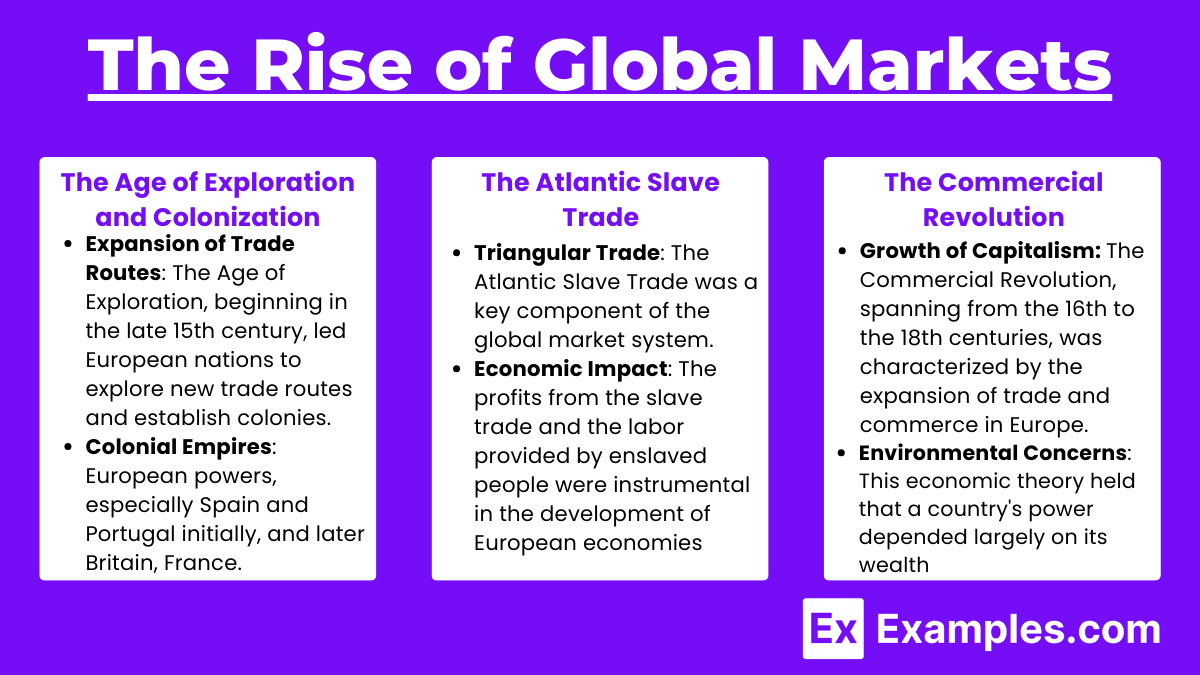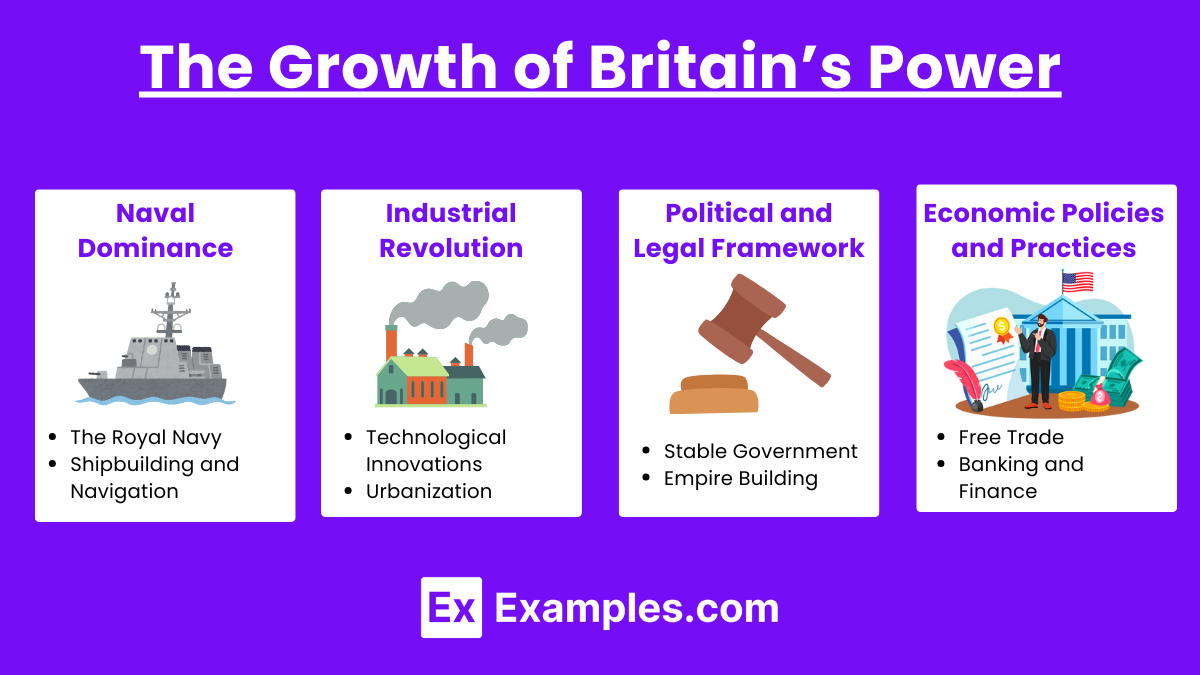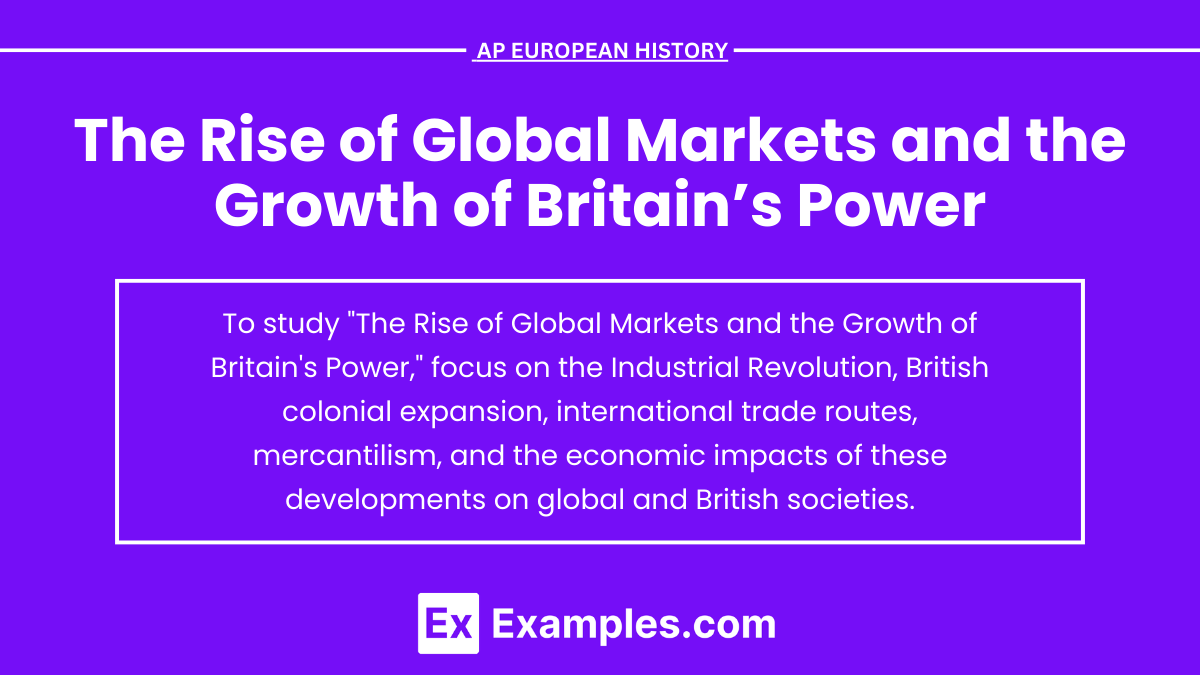The rise of global markets from the 16th to the 19th centuries was marked by European exploration, colonization, and the expansion of trade networks. Britain emerged as a dominant power due to its naval supremacy, innovative economic practices, and extensive colonial empire. This era, fueled by mercantilism and the Industrial Revolution, saw Britain leveraging its resources and technological advancements to establish a global economic presence, profoundly shaping the world economy and its own geopolitical influence.
Learning Objectives
The Rise of Global Markets and the Growth of Britain’s Power in the AP European History exam, you should learn about the Age of Exploration, the impact of mercantilism, the role of joint-stock companies, the significance of the transatlantic slave trade, the technological and economic changes of the Industrial Revolution, Britain’s naval supremacy, key treaties and agreements like the Treaty of Utrecht, and influential figures such as Queen Elizabeth I, James Watt, and Robert Clive. Understanding these elements will help explain Britain’s emergence as a global power.
The Rise of Global Markets

1. The Age of Exploration and Colonization:
- Expansion of Trade Routes: The Age of Exploration, beginning in the late 15th century, led European nations to explore new trade routes and establish colonies. Notable explorers like Christopher Columbus, Vasco da Gama, and Ferdinand Magellan expanded European knowledge and control of the world.
- Colonial Empires: European powers, especially Spain and Portugal initially, and later Britain, France, and the Netherlands, established vast colonial empires. These colonies provided raw materials and new markets for European goods, which were critical to the development of global trade.
2. The Atlantic Slave Trade:
- Triangular Trade: The Atlantic Slave Trade was a key component of the global market system. It involved the forced transportation of Africans to the Americas, where they were sold as slaves. This trade formed a triangular route: European goods to Africa, enslaved Africans to the Americas, and American raw materials (such as sugar and cotton) back to Europe.
- Economic Impact: The profits from the slave trade and the labor provided by enslaved people were instrumental in the development of European economies, particularly in the growth of British industries.
3. The Commercial Revolution:
- Growth of Capitalism: The Commercial Revolution, spanning from the 16th to the 18th centuries, was characterized by the expansion of trade and commerce in Europe. It saw the rise of joint-stock companies, banking, and insurance, all of which were essential for financing exploration and trade.
- Mercantilism: This economic theory held that a country’s power depended largely on its wealth. European nations sought to accumulate precious metals and maintain a favorable balance of trade by exporting more than they imported. This led to intense competition for colonies and resources.
The Growth of Britain’s Power

1. Naval Dominance:
- The Royal Navy: By the 18th century, the British Royal Navy had become the world’s most powerful naval force. This dominance was crucial for protecting Britain’s trade routes and colonies. Key victories, such as the defeat of the Spanish Armada in 1588 and the Battle of Trafalgar in 1805, solidified British naval supremacy.
- Shipbuilding and Navigation: Advances in shipbuilding and navigation, including the development of more robust ships and better navigational tools, enabled longer and safer voyages, facilitating trade and colonial expansion.
2. Industrial Revolution:
- Technological Innovations: The Industrial Revolution began in Britain in the late 18th century, transforming the economy from agrarian to industrial. Innovations such as the steam engine, mechanized textile manufacturing, and improved iron production processes significantly increased production capacity.
- Urbanization and Economic Growth: The rise of factories led to urbanization, as people moved to cities in search of work. This economic growth further strengthened Britain’s position as a global power, providing the resources needed to maintain its military and colonial dominance.
3. Political and Legal Framework:
- Stable Government: Britain’s political stability, exemplified by the Glorious Revolution of 1688, which established a constitutional monarchy, provided a stable environment for economic growth. The rule of law and property rights were well protected, encouraging investment and innovation.
- Empire Building: The British Empire expanded significantly during this period, with colonies in the Americas, Africa, Asia, and the Pacific. This expansion was driven by a combination of military conquest, trade, and settlement.
4. Economic Policies and Practices:
- Free Trade: In the 19th century, Britain increasingly adopted free trade policies, reducing tariffs and trade barriers. The repeal of the Corn Laws in 1846, which had imposed tariffs on imported grain, is a notable example of this shift.
- Banking and Finance: London became the world’s financial capital, with the Bank of England playing a central role in global finance. The British pound sterling became the dominant currency in international trade.
The rise of global markets and the growth of Britain’s power were interlinked phenomena that transformed the world. Britain’s strategic use of its naval strength, economic innovations, and colonial expansion enabled it to dominate global trade and amass unprecedented wealth. Understanding these historical developments is crucial for comprehending the broader trends in European and world history during this period.
Examples of The Rise of Global Markets and Britain’s Power
- Colonial Expansion : Britain’s vast colonial empire provided raw materials and markets, boosting its economic and global influence.
- Industrial Revolution : Technological innovations and mass production made British goods competitive globally, solidifying Britain’s industrial dominance.
- Navigation Acts : These laws monopolized trade routes, ensuring British control over commerce with its colonies.
- British East India Company : The company expanded British influence in Asia, particularly India, significantly contributing to Britain’s wealth.
- Financial Institutions : The Bank of England and London Stock Exchange made London a global financial center, supporting overseas trade and investments.
Practice Test Questions on The Rise of Global Markets and the Growth of Britain’s Power
Question 1: What was a key factor in Britain’s rise as a global power in the 18th century?
A) Isolation from European conflicts
B) Development of a strong naval fleet
C) Limiting trade with colonies
D) Adoption of a barter system
Answer: B) Development of a strong naval fleet
Explanation:
Britain’s rise as a global power in the 18th century was significantly influenced by its strong naval fleet. This fleet allowed Britain to protect its trade routes, control key maritime chokepoints, and expand its influence across the globe. The British Navy not only defended the country against invasions but also played a crucial role in establishing and maintaining a vast empire. The development of a powerful navy enabled Britain to project its power overseas, secure valuable colonies, and dominate global trade routes, making it a leading global power.
Question 2: Which economic policy helped Britain dominate global markets during the 18th century?
A) Mercantilism
B) Laissez-faire
C) Communism
D) Feudalism
Answer: A) Mercantilism
Explanation:
Mercantilism was the dominant economic policy in Britain during the 18th century, which played a crucial role in its dominance in global markets. Under mercantilism, the government encouraged exports and restricted imports to accumulate wealth in the form of gold and silver. This policy included measures such as the Navigation Acts, which mandated that goods transported to and from British colonies must be carried on British ships. These acts ensured that profits from trade stayed within the British economy, bolstering its financial power and allowing Britain to invest further in its military and naval capabilities.
Question 3: How did the Industrial Revolution contribute to the growth of Britain’s global power?
A) By reducing the need for raw materials
B) By decreasing labor demand in colonies
C) By increasing production and innovation
D) By isolating Britain from international trade
Answer: C) By increasing production and innovation
Explanation:
The Industrial Revolution was a period of significant technological advancement and increased production capacity in Britain. This transformation enabled Britain to produce goods more efficiently and at a lower cost than many of its competitors. The rise of factories and the use of machinery led to mass production, which not only satisfied domestic demand but also allowed Britain to export goods globally. This industrial edge, combined with Britain’s extensive colonial network, facilitated the flow of raw materials from the colonies to Britain and finished goods back to the colonies and other markets. Thus, the Industrial Revolution greatly enhanced Britain’s economic strength and global influence, consolidating its status as a leading global power.


